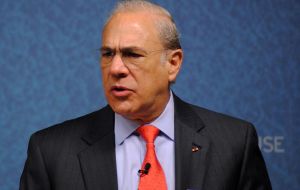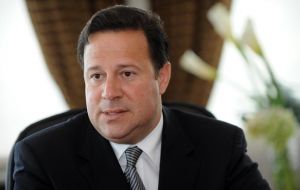MercoPress. South Atlantic News Agency
Panama Papers shows shell companies prevail despite G20 announced efforts
 G20 leaders representing 80% of world economy, have vowed to crack down on the practice blamed for helping conceal money laundering, corruption and tax evasion
G20 leaders representing 80% of world economy, have vowed to crack down on the practice blamed for helping conceal money laundering, corruption and tax evasion  Panama “is the last major holdout that continues to allow funds to be hidden offshore from tax and law enforcement authorities,” said Ángel Gurria
Panama “is the last major holdout that continues to allow funds to be hidden offshore from tax and law enforcement authorities,” said Ángel Gurria  Panama President Juan Carlos Varela said his government had “zero tolerance” for illicit financial activities and would cooperate “vigorously”
Panama President Juan Carlos Varela said his government had “zero tolerance” for illicit financial activities and would cooperate “vigorously” The leak of 11 million documents from a Panama-based law firm offers a glimpse into the shadowy world where the rich and powerful hide their money, raising sharp questions about the use of shell companies that obscure the identities of their true owners, even if they aren’t illegal by themselves.
Leaders of the Group of 20 — representing about 80% of the global economy — have vowed to crack down on the practice, which is blamed for helping conceal money laundering, corruption and tax evasion, while some countries have tightened rules on using them — but not enough to satisfy anti-corruption activists.
The G20 leaders adopted 14 principles in November 2014 at a summit in Brisbane, Australia. The essence was that companies should be able to identify to authorities who their real owners are. Otherwise, that opens the way for money laundering — obscuring the origins of money made from illegal activity — and tax evasion.
Yet in a follow-up report in September, the anti-corruption group Transparency International said that actual implementation of the recommendations into national law had lagged. Most member countries had at least adopted a clear definition of what real ownership means, but lagged on requiring law firms and banks servicing the rich to require — and independently confirm — the identity of the real owner.
Casey Kelso, advocacy director at anti-corruption organization Transparency International in Berlin, said the reports “should light a fire under governments to take action.”
“We hope that it will galvanize political leadership to actually walk the talk ... You can now see the names of the people,” he said.
Development advocates say shell companies help drain tax and natural-resources revenue from poor countries that desperately need the money.
News organizations working with the Washington-based International Consortium of Investigative Journalists (ICIJ) have been processing the legal records from the Mossack Fonseca law firm that were first leaked to the Süeddeutsche Zeitung newspaper based in Munich, Germany.
In reports that began Sunday, they said the document dump that they dubbed the “Panama Papers” shows the hidden offshore assets of politicians, businesses and celebrities, including 12 current or former heads of state.
Panama “is the last major holdout that continues to allow funds to be hidden offshore from tax and law enforcement authorities,” said Ángel Gurria, secretary-general of the Organization for Economic Cooperation and Development (OECD), an organization representing mostly rich countries. It has been working with the G-20 to restrict the use of shell companies.
Panamanian President Juan Carlos Varela said his government had “zero tolerance” for illicit financial activities and would cooperate “vigorously” with any investigation.
The ICIJ said the documents involve 214,488 companies and 14,153 clients of Mossack Fonseca. The nonprofit group said it would release the full list of companies and people linked to them next month.




Top Comments
Disclaimer & comment rules-

-

-

Read all commentsPanama President Juan Carlos Varela said his government had “zero tolerance” for illicit financial activities and would cooperate “vigorously”
Apr 07th, 2016 - 09:02 am 0“...but, please, before that transfer my money to the seychelles.”
Even Obumma has recognized that much of what they do is LEGAL! And, he says, that's the problem.
Apr 07th, 2016 - 05:32 pm 0AHH, the G20. A bunch of halfwits trying to outwit somebody with wits AND who know how to use them.
they are all totally innocent,
Apr 07th, 2016 - 07:13 pm 0who says so ?
they do obviously.
lol
Commenting for this story is now closed.
If you have a Facebook account, become a fan and comment on our Facebook Page!